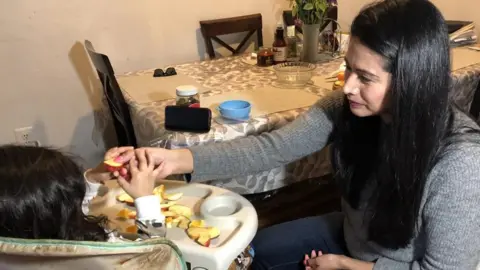In the US, new guidelines on how paediatricians should treat childhood obesity have been met with some criticism.
The American Academy of Paediatrics has recommended intensive therapy for children as young as six and weight loss drugs and surgery for those in their early teens.
But some fear this approach will come at the expense of a healthy and active lifestyle.
One child in five is obese in the US.
Doctors say early treatment is needed to prevent lifelong conditions, such as diabetes.
I meet Tracy and her 14-year-old daughter, Jaelynn, in a suburb of Washington. They live in a residential complex surrounded by highways and a few patches of green grass.
Tracy is upset - she's just received the news that Jaelynn's school is getting rid of the Physical Education class and replacing it with a health course taught in the classroom.
She's worried because her daughter already doesn't get much chance to move and socialise with her classmates. She thinks the new class will make it even more difficult.
Jaelynn tells me that last year she enrolled in a summer camp organised by the YMCA. She would go on field trips during the day and spend plenty of time outside.
"It was really fun," she says. "I felt better, I felt healthier, and I loved making friends."
Jaelynn has suffered from kidney disease since she was a child, and her being overweight negatively impacts her condition. But her mum says during the summer things started to improve.
"She lost twelve pounds in three months," Tracy says. "Her nephrologist was really impressed that she could lose so much so quickly. Her health improved and her confidence as well."
This change, Tracy tells me, showed her how important it was for her daughter to do activities outside.
For years, doctors have promoted a healthy lifestyle as the best way to fight childhood obesity. But in recent weeks the debate over this issue has reignited, as the American Academy of Paediatrics issued new guidelines for the first time in 15 years.
They say that eating well and exercising is not always enough.
"Medical treatment and prevention need to go hand in hand," says Dr Nazrat Mirza, one of the authors of the guidelines.
"Obesity is a chronic medical condition and in addition to healthy lifestyle changes, we have shown that medication works, and surgery also works."
Dr Mirza says the guidelines want to shatter the double standards that people with obesity face by making medical treatments readily available, like for any other condition.
"Just like asthma, just like hypertension," she says. "In hypertension you would tell somebody to cut salt, but then the blood pressure is still high, so you're still going to give them medication."
But some doctors are concerned by the emphasis on intensive early intervention.
Dr Katy Miller works with teenagers struggling with eating disorders at Children's Minnesota, and she fears these guidelines might be "setting kids up for a challenging relationship with their bodies".
"We are proposing treatment strategies that are expensive and even in the best circumstances are often unsuccessful," she says.
She thinks the focus should be more on the societal factors that impact childhood obesity.
"How can we ask someone to diet when we're not addressing things like poverty, food scarcity and housing instability?"
"I had a 15-year-old patient who had been told by doctors to lose weight," she adds, "and his family has been living in extreme poverty. They had a change in their financial circumstances, and he said to me 'do you know what the best part about having money is? You can buy fruit that isn't mouldy'."
On a cold grey day, I meet Julia. She's a mum of three and she has just finished a year-long support group on healthy cooking organised by the YMCA.

"I am the one who cooks at home," she tells me proudly, "so if I cook healthy food, my family stays healthy."
She was referred to the program because she had been diagnosed with high cholesterol and prediabetes during pregnancy. Her teenage son, she tells me, was starting to have health issues as well, and that motivated her.
While she cuts some fruit for her toddler, I ask her what she thinks of the new guidelines.
She shakes her head.
"As a parent, I'd first try changing the food we eat and getting my children to do sports," she says.
"In our country, kids don't have that many opportunities to exercise, schools don't have enough sports programs. Only if I had tried everything, then I might consider it."
On the opposite side of town, Tracy agrees. "Surgery and medication should be the last resort," she says.

.jfif)
Post a Comment